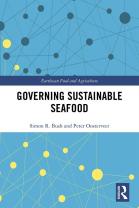People make seafood sustainable. Fish can’t be governed, but those catching and growing them can be. How, where, why and to what effect? These are the questions that need answering.
‘Governing Sustainable Seafood’ book now available
Taking a social science approach, this new book by Simon Bush and Peter Oosterveer explores the governance of sustainable seafood, which is fundamental to food and nutrition security as well as being an important source of income and employment in many regions around the world
The hardcover and e-book version can be ordered directly from Taylor and Francis, Routledge or via Amazon or Google Play
‘Pragmatic tolerance’ maintains the PNA vessel day scheme
The vessel day scheme (VDS) has the potential to improve economic benefits for PNA members and to contribute to sustainability of the tuna stocks. But recent reviews show that monitoring and enforcement remains weak leading to violations of the agreement. In a recently published (open access) paper, Agnes Yeeting and colleagues examine the effectiveness of the VDS and its implications for fisheries regionalism. The results show that allowing fellow PNA countries states to partially comply with VDS rules plays a key role in stabilising the agreement.
Who governs aquaculture standards?
Over the last decade a number of so called ‘meta-governance’ arrangements have emerged to conform seafood standards to more credible practices. But how do these arrangements work? A new open access paper published in the Journal of Environment and Development by Phatra Samerwong and colleagues analyses what led to the emergence of three prominent meta-governance arrangements – GSSI, ISEAL and ASEAN-GAP – and what effect they have on both private and public aquaculture standards.
FADs, FAD-Free, FIPs or MSC?
The rise of sustainability claims in the global tuna industry has grown over the last decade, with NGO and market influence largely driving the growth. But what affect will have on the future sustainability of the tuna industry? I addressed this question in my recent presentation at the 6th European Tuna Conference held in Brussels in April.
Is the global impact of aquaculture misunderstood?
In a recent paper published in Nature, Golden et al. (2016) argued that limited opportunties for expanding fisheries production means that aquaculture needs to play a greater role in securing human health in developing countries. But in making their argument they overlook the role that aquaculture already plays across the entire global South. A far better understanding the domestic and South-South importance of aquaculture production and trade is clearly needed. Read the respone to Golden et al. by Ben Belton and colleagues.
Which fishers can access FIPs?
Fishery improvement projects (FIPs) aren’t accessible for everyone. Fishers who don’t the right capabilities to participate are likely to be left out and in the long term less likely to improve their sustainability. Frazen Tolentino-Zondervan and colleagues report these findings in their recent PLoS ONE paper.
Is pangasius safe to eat?
Pangasius has emerged as one of the most controversial seafood products in both Europe and the US. In a recent paper published in Reviews in Aquaculture we ask whether the controversy justified. Watch and read the video and transcript of our presentation at GOAL 2016.
Certify retailers not farmers?
The limits to certifying the sustainability of small holder producers is increasingly apparent. This doesn’t mean that certification isn’t relevant for creating change. But it does means we need to start looking for alterative models. Read my new perspective piece in the Solutions journal.



